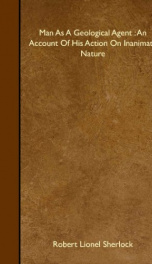man as a geological agent an account of his action on inanimate nature

MAN AS A GEOLOGICAL AGENT - I922 - FOREWORD - MANY animals altcr the surface of the earth to a certain extent to suit their own convenience and co nfort. Some burror-or dig holes, others rnalic mounds of . arious ki lcls i . l 1 i l s c 111t., such as thc t c. nvc-Sc, l an1 and alter - tc rcol rs ic7si, t h results that arc 1. 110 . . Incans rls nilic int. Ihc tul-l a-ic 01 s - pent, sr. a nl of thc L a . 111c in i s s c x , for cxa ul lca. rc 1 1-01 1I ly due in great part to the ivork of the t c lvcrs - l l i c l i ii. ca l . . . there in prehistoric tirnes. lhc cti ti - c s 1 tiininls in altering thcir s irruunclings. ho vcvc r. ire IN t pi-o qressive. Animals mcrcly rcpc. lt the. S o l t l instinctive coursc. incl thc vorl l from t hc ir IN int of view nek-cr i ecorncs a rnorc. clcsiral lc 1 1 1. cs t o li-c. in. Rlan. on the other h intl. cvcr sin-c. 11 s i l tJ l- t ico. has pro rcssctli n atlaptinq su-rouncl I I l L i I . I I I . t o 111s ncctls. Coriir c ic 1 i v i gp i-ki i 1 c 1 1 i i 1 r Iic11 r ic, cc of stone usclul f o r his pur1 osc is arl im lrrncnt. h c would graduallv i cyin t o chip the. st m cs hi nsc f l t o make them o f the rcquiretl shape. Ncst, hc 1c rnccl the preparation of rnetals which would provitle tools both more efficient and more varied. Finally, his materials for industry became almost unlimited. Beginning with the roughest of shelters in the forest. he would soon learn to appreciate the greater comfort of an overhanging rock or a cave. The success of a pile of stones heaped up outside to increase protection from the blast, would lead to the building of pendent structures away from the rock-shelters. These primitive houses would be grouped for safety within an enclosure. In time, indeed, the village or town would arise, and modern conditions would gradually be reached. Beginning by digging holes in the ground to obtain materials for his tools and to make traps for catching large animals for food, he would gradually learn the advantage of shaping the surface to his convenience. In short, one successful undertaking would lead to another, and there could never be an end to his enterprise. As soon as man became grouped in definite communities, new problems would arise, and his interference with surrounding nature would extend in fresh directions. We have learned some of these directidns from the remains of the early civilisati nso f the East. There would be the supply of building material and road metal, the provision of water, the removal of waste, and especially the making of lines of communication with neighbouring settlements. In all these directions there has been continual progress as civilisation has advanced, and in a long-settled country it is now sometimes difficult to realise the primitive conditions under which the various developments began. Dr Sherlock could not have chosen a more appropriate long-settled country than Great Britain by which to illustrate the extent of mans activities in altering - FOREWORD the earths surface to suit his needs. London is an excellent instance of a big city in which the accumulations and works of centuries have converted an irregular and yaried wilderness into a convenient and comfortable habitation. The story of the tracks, roads, canals, and railways of the country is exactly that of the progressive changes in transportation in general...
Users who have this book
Users who want this book
What readers are saying
What do you think? Write your own comment on this book!
write a commentif you like man as a geological agent an account of his action on inanimate nature try:
Other books by this author
Do you want to read a book that interests you? It’s EASY!
Create an account and send a request for reading to other users on the Webpage of the book!

